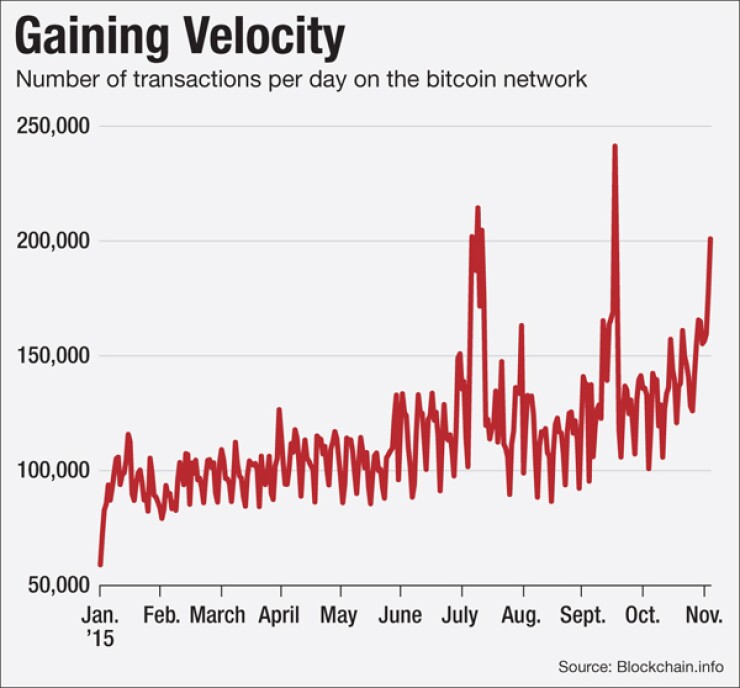-
BBVA and USAA are among a group of participants in a $75 million investment in the Bitcoin wallet provider Coinbase, an unusual move given the cool posture most financial institutions have taken toward virtual currency.
January 20 -
There is a time, a place and a customer base for pseudonymous cryptocurrency. For regulated financial institutions, other types of shared ledgers those whose validators are legally accountable for certain terms of service may provide unique utility.
November 3 -
Though lukewarm about Bitcoin itself, bankers see promise in the technology it runs on, specifically the distributed ledger, for efficiency and security improvements in areas like payments and securities handling.
June 1 -
October saw the three main card networks invest in bitcoin-related companies, which comes on the heels of major banks exploring the use of bitcoin and blockchain technology to solve some industry pain points.
October 29

The holy grail in retail banking is the ability to give consumers a full view of their finances all in one place.
Consumers want to know how much they owe, how much they've tucked away and how well their portfolio is performing. And some people want to know how their investment in bitcoin is doing, too. Well, enough of them for USAA to creep into the world of cryptocurrency by partnering with a bitcoin wallet provider.
The San Antonio bank has integrated Coinbase's application program interface, which lets customers monitor their Coinbase wallet balances when they log into their bank accounts, the companies announced late Tuesday.
"Our highly mobile member base is looking at new innovations," said Darrius Jones, assistant vice president of enterprise innovation for USAA, in an interview on Wednesday. "Our military members move quite a bit compared to other consumers. What better than being able to look at your various household account balances in a single place?"
Prevailing wisdom has written off the cryptocurrency as toxic for regulated institutions. The politically correct move has been for banks to experiment with distributed ledgers and databases inspired by bitcoin's blockchain while disowning the currency. The tide, however, seems to have
"There have been a lot of banks interested publicly in blockchain technology but it's not clear what they mean by that," said Nick Tomaino, business development manager at Coinbase. "Most are talking about private blockchains versus bitcoin technology and none have shipped anything. This is a bank actually talking about bitcoin and is shipping something."
The bank
Jones said he sees that bundling of nonbank financial services into the digital banking platforms as a differentiator between USAA and other banks.
It is then perhaps unsurprising that USAA is the bank to bring bitcoin into the fold of its retail products. USAA has established itself as one of the more proactive U.S. banks in the innovation game and a competitor in the personal-financial-management space. It was first to offer online and mobile check deposits — that was in 2011. Now, it's building on the financial health theme, which FitBit-for-money-type companies such as Moven and Simple are helping grow, by
Integrating a way to view cryptocurrency balances is a "logical evolution in digital transactions," said
For now, members can only view their bitcoin balance on USAA's channels. Whether USAA will allow its customers to exchange currency or transact in bitcoin will depend on the results of the pilot, which began on Monday and will run for about 90 days.
"You can imagine some other things they might be able to do on USAA.com," Tomaino said.
Neither Coinbase nor USAA could disclose the figures, but Tomaino said the overlap between their customers is "really high."
"We kind of scratched our heads together and thought: what makes the most sense for them to experiment with bitcoin?" Tomaino said.
In their research, the companies said that there was both qualitative and quantitative data that showed USAA members were interested in being able to monitor their bitcoin wallet through their primary USAA banking channels. Given their prowess in digital innovation, perhaps their customers have come to expect the bank to be an early adopter, too.
"We're focused on having that new technology they're more able to adapt or willing to try," Jones said.
Brad Smith, managing director at Cornerstone Advisors, said the announcement mainly reinforces USAA's brand of being user-centric. In other words, it is good marketing, but may not result in much activity.
"It expands awareness of a mobile wallet and mobile banking app, expands awareness of a company they just invested in and allows them to see how many customers are actually using this feature."
Account aggregation has been around for a long time, he said, but realistically, many that were initially excited about that kind of feature would say that initiative has failed; that there hasn't been widespread consumer adoption of account aggregation, at least in its first and second iterations.
"This is a niche within a niche within a niche," he said.
Still, he praised USAA as an early adopter and leader in innovation.
"A whole lot of traditional banks watch what USAA does because most of their bets have been right," he said. "They're a pretty good bellwether for technology-based convenience goods and services."
Robert Barba contributed to this report.





